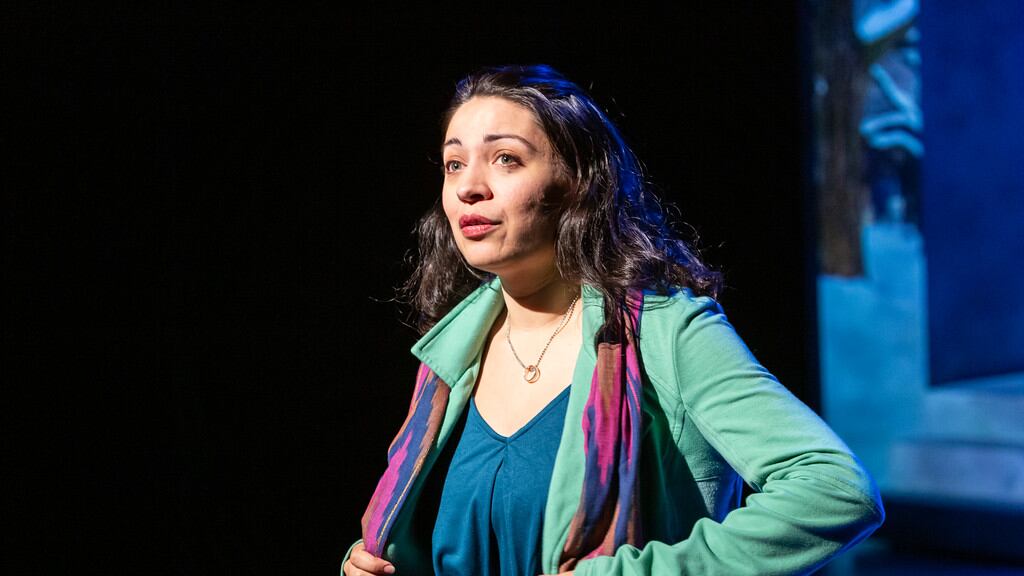There’s a lovely moment in Christopher Oscar Peña’s play awe/struck when a young woman, Denia, marvels at the sight of falling snow. The moment, though, is brief and happens just before she’s ruthlessly beaten into a coma, creating a scene that literally combines the two words of the play’s title.
Making its world premiere at Profile Theatre, directed by Josh Hecht, awe/struck portrays brutal societal wounds that are bound to make all but the most callous souls flinch. As they enter the theater, audiences are greeted by a grim set of gray walls, while looping atonal music sounds as if it’s being pulled through the darkness of a long narrow tunnel.
After a lengthy prologue that includes an ironic recitation of racist “jokes,” the play then opens with Julio (Jimmy Garcia) forcing his rebellious daughter, Denia (Crystal Ann Muñoz), to leave what the script describes as their “unnamed Latin American country” and start a new life in Chicago.
To persuade her to go, he describes two recent hate crimes that seem to prove she’d be safer in the U.S. Both of the stories, which Julio tells in vivid detail, are truly horrifying. One involves the maiming of a woman who, like Denia, is a lesbian. Denia, though, only agrees to flee after Julio also tells her that her lover, Rosa, has been murdered, a revelation that the play doesn’t linger on as long as it could.
In Chicago, Denia is isolated not only by her grief at losing both her home and Rosa, but also by language. Among whites, she now speaks in accented English that Muñoz hadn’t used in previous scenes, emphasizing Denia’s feeling of otherness. It isn’t until she becomes friends with Drew (Skyler Verity), a gay man who accepts and understands her, that she can acknowledge the beauty of Chicago and let go of her anger toward Julio.
However, just as we finally see Denia smiling and talking on the phone with her father (she tells him she’s struck by the “sheer awe of it all…it IS a beautiful country”), Monique (Lea Zawada) approaches her. A white houseless teen mother bursting with racist vitriol (“you take and you take and you take like parasites!” she bellows), Monique picks up a rock and strikes Denia again and again, seeming to release a lifetime of pent-up rage over being unseen and denigrated.
The shockingly violent act, which Peña says is based on a true event, turns Monique into a monster. Yet Peña doesn’t portray Denia as a saint, choosing to include an earlier scene in which she insults Monique, who is already at the end of her rope.
Hecht, in his program notes, says that the play offers a “vision for a community of care.” We see a hint of this in a tense scene where Julio visits Monique in jail, trying to force her to reveal some sign of remorse for destroying his daughter. The two actors deftly build the tension here. Zawada sits with a jutting chin and shoulders that are stubbornly hunched, while Garcia leans forward on the edge of a metal stool and strikes the table with his fist, only to gradually soften as he comes to realize that Monique, like him, has lost a daughter.
The fact that Zawada recites the play’s prologue, which we’re told is a statement by Peña himself, further complicates our perception of who all the characters are and whether we’re justified in defining and judging them at all. Rife with questions (including what it means for a work to be “Latino”), the opening seems to anticipate a divided audience reaction to the story, which sometimes awkwardly mixes harsh realism with artful coincidences (especially as the lives of major characters intersect in the final scenes).
As awe/struck moves toward its ambivalent conclusion, still more questions arise. Does Peña intend to offer us hope? Is he advocating forgiveness? Whether we can face such questions depends on how traumatized we are about what we’ve seen on the stage, in the news, and in our lives…and whether we can, as the play tries to, believe that Monique is as human as we are.
SEE IT: Awe/struck plays at Imago Theatre, 17 SE 8th Ave., 503- 242-0080, profiletheatre.com. 7:30 pm Thursday-Saturday and 2 and 7:30 pm Sunday, through Nov. 19. $45.
